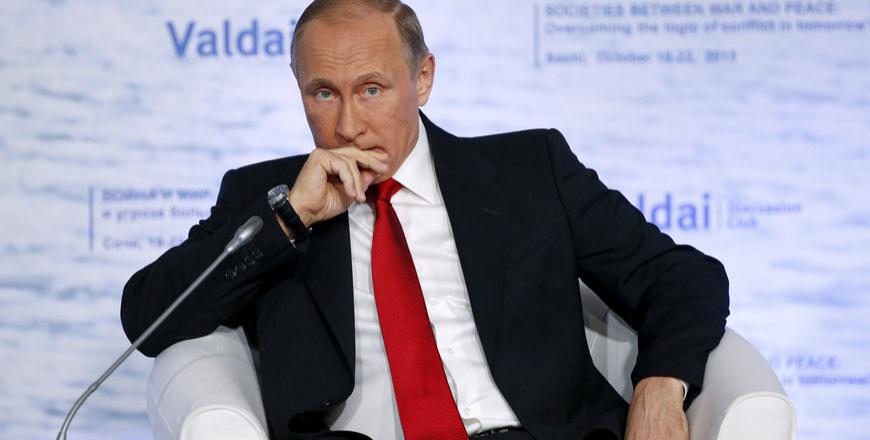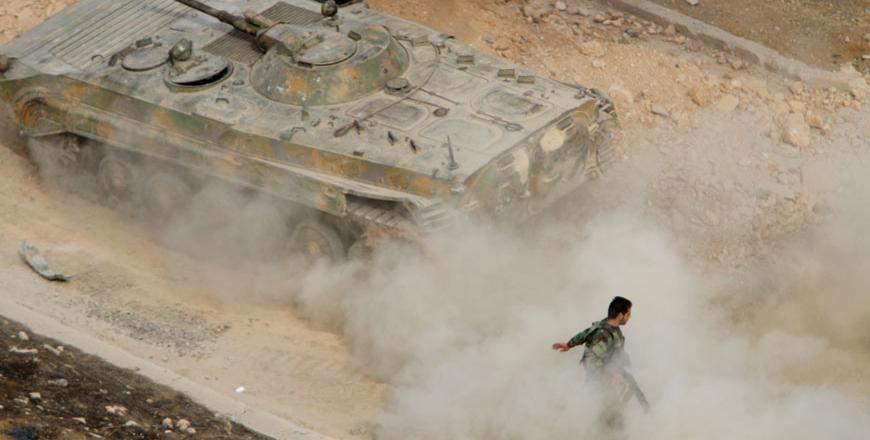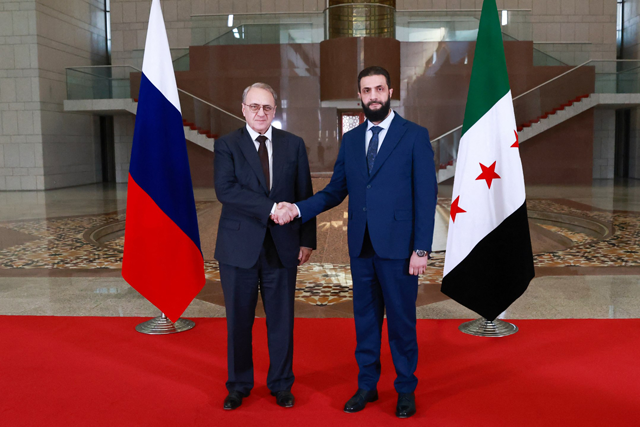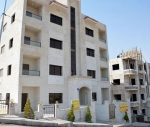You are here
Putin’s high-stakes Syria gamble: with or without Assad
By AFP - Oct 22,2015 - Last updated at Oct 22,2015

Russian President Vladimir Putin attends a session of the Valdai International Discussion Club in Krasnaya Polyana, Sochi, Russia, Thursday (Reuters photo)
MOSCOW — This week's surprise Moscow summit between Russian President Vladimir Putin and Syrian leader Bashar Assad was perhaps one of the most sensitive meetings the Kremlin walls have seen in recent times.
At stake was the future of the Syrian conflict — and also Russia's place on the world stage as Putin seeks to muscle his way back to global influence after months of Western isolation over Ukraine.
Assad's visit — and Moscow's diplomatic flurry in its aftermath — might have confirmed the scale of Putin's ambitions and his willingness to support his ally, but analysts say the Kremlin is not wedded to keeping the Syrian strongman in power indefinitely.
The Syria military operation is costing recession-hit Russia an estimated $4 million a day, according to estimates by IHS Jane's, and there are fears it could prompt blowback in the form of Islamist attacks at home, so Moscow's strategy is not without its risks.
Assad came to see his key ally Putin on Tuesday accompanied by only a lone secretary to take notes, in his first known overseas trip since Syria erupted in unrest in March 2011.
His Russian host, by contrast, came with a high-powered delegation including his prime minister, defence minister and the head of the foreign intelligence service.
The meeting followed three weeks of Russian air strikes in Syria in support of Assad's regime, Moscow's first military intervention outside the former Soviet Union since the ill-fated Afghanistan occupation in 1979.
'At a crossroads'
Stung by Washington's refusal to cooperate and share intelligence over Syria, Putin has sought to revive stalled peace talks and force the war's key players — including some of Assad's staunchest critics — to the negotiating table.
"We are at a crossroads now," said Vladimir Ahmedov, senior researcher at the Institute of Oriental Studies of the Russian Academy of Sciences.
"Seeing that the United States has dug in its heels and Europe is sitting on the fence, Putin is holding talks with key regional players — with Turkey and Iran on one side and Saudi Arabia and Egypt on the other side."
As soon as Assad left Moscow, Putin pressed on with his diplomatic blitz by holding phone talks with the leaders of Turkey, Saudi Arabia, Egypt and Jordan.
On Friday, Syria will be on the table in crucial talks between Russian Foreign Minister Sergei Lavrov, US Secretary of State John Kerry and their Turkish and Saudi counterparts in Vienna.
For all the pledges of continued military and diplomatic support for Assad, observers say that in long term Putin will put Russian interests first — and will not keep the hugely controversial leader in power at any cost.
Instead, Russia is seeking to use its long-standing ties to Syria to jostle for influence in the Middle East and ensure Moscow has a crucial role in Syria's post-war political settlement.
"Not only is Putin eyeing a role as peace maker but he also wants Russia to become a great power again," independent analyst Grigory Melamedov told AFP.
"If that is doable without Assad remaining in power, why not?"
Ahmedov struck a similar chord, saying Russia understood that the United States and its allies would never agree to the idea of Assad remaining in power in post-conflict Syria.
"We won't be able to clean him up," he said. "I don't rule out that the name of a possible successor was discussed at the meeting."
One high-ranking European diplomat told AFP he heard Putin say in talks that he does not want Assad to leave power in disgrace or suffer the fate of Iraq's Saddam Hussein or Libya's Muammar Qadhafi — one hanged, the other lynched.
Political transition
Observers point out that while three weeks of Russian bombing have not dramatically changed the situation on the ground in Syria, they have had some impact.
Some of Assad's most vocal opponents including the United States, France and Britain have apparently softened demands for Assad to quit power immediately and Turkey has said he should leave during a transitional period.
"Putin hopes the military intervention will ultimately force the countries that support the Syrian opposition — if not the rebels themselves — to reach some form of accommodation with the remnants of the regime and is prepared to retire Bashar Assad to achieve that goal," said Jeremy Binnie, Middle East editor at IHS Jane's Defence Weekly.
More than 250,000 people have been killed and millions forced from their homes in the four-year Syrian war.
However, Putin cannot help Assad to significantly change the situation on the ground without committing more troops or funds, said Ben Moores, senior analyst at IHS Jane's, saying the current intervention is already costing up to $4 million a day.
"In a war like that you need to hold ground," he told AFP. "And they struggle to hold ground. Political settlement is the only option."
Related Articles
SOCHI, Russia/MOSCOW — Russian President Vladimir Putin said his Syrian counterpart Bashar Assad had told him he was ready to talk to
MANAMA — Pentagon chief Jim Mattis told Arab leaders on Saturday that Russia is no replacement for the United States in the Middle East foll
DAMASCUS — Syria's new leaders said Wednesday they had discussed "transitional justice" with the first Russian official delegation to visit

















